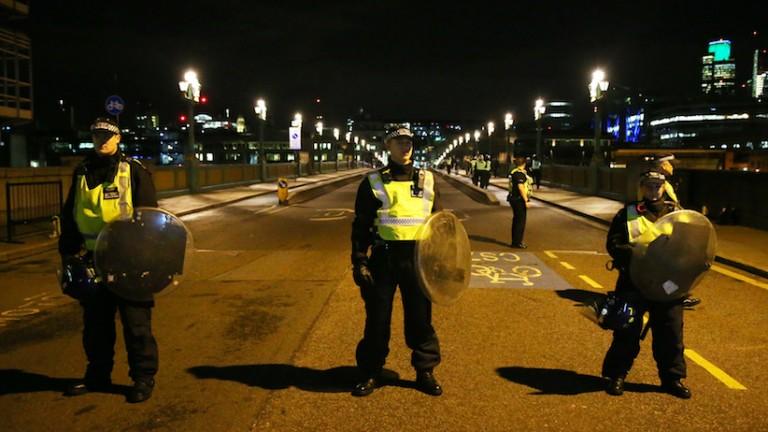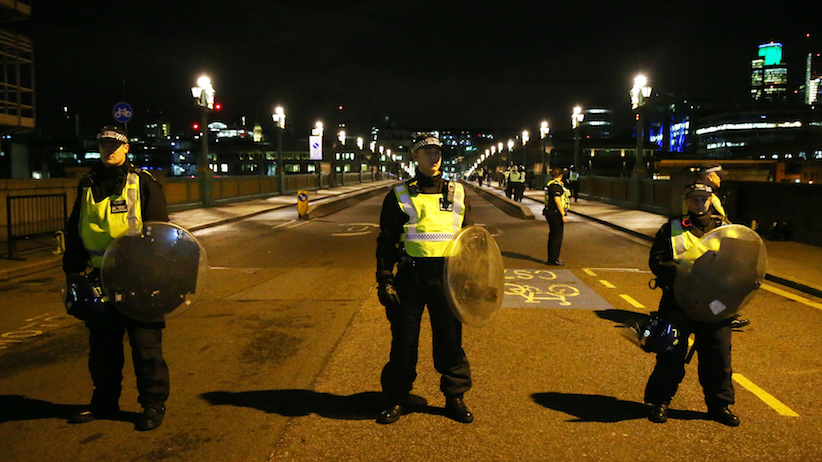I knew the London Bridge terrorist
Opinion: One man’s search for lessons and answers after Khuram Butt—a man he befriended a year ago—led a terror attack on London Bridge

Police officers guard the approach to Southwark Bridge after an incident near London Bridge in London, Britain June 4, 2017. REUTERS/Neil Hall – RTX38VVC
Share

Anthony Vasquez-Peddie is a Canadian freelance writer and editor who travels the world.
It was early June, and I was enjoying a sunny afternoon in Mexico City. Butterflies weaved around hummingbirds enjoying the lush garden my landlord tended to so meticulously. The neighbour’s cat, leery of my presence on its turf, stared me down from a safe distance.
Then my phone stirred to life. A friend from England had sent me a series of texts that brought a dark cloud over my bright little paradise.
“Dude, have you seen the news?” she began. “About the suspects in the London attacks.”
I searched for the latest on the violence in the British capital, an attack on London Bridge that left eight dead, including one Canadian. The headlines described how the attackers had plowed into pedestrians in a white van before jumping out and knifing people. It all ended when the assailants were gunned down by police.
Then a familiar face caught my eye—the photo of a suspect. I tapped on the story and my suspicion was confirmed: Khuram Butt, a man I met 10 months earlier in London and worked closely with for four weeks, was named by police as one of the perpetrators and the ringleader of the atrocity.
We had taken a course together in August of 2016 to earn a certificate in teaching English to speakers of other languages. It’s the kind of thing a person does to get a job at a language school or set up a private practice. Many classmates intended to use it to earn money while travelling or to help members of their community. The friend who had texted me plied her newly learned trade while touring Southeast Asia. Another returned to a teaching post in China armed with more skills. Others went to France or Spain to pursue opportunities. A few were content working out of their living rooms, helping neighbours more easily integrate with Britain.
All this begged the question: did Butt, a husband and father of two small children, see a future for himself during the time I knew him? Or was it all a ruse, even then?
MORE: The London Bridge attack, and Britain’s shattered sense of immunity
It was a strange sensation, being so personally and curiously tied to a tragedy. The feeling of helplessness—wondering if there was anything that could have been done to prevent the deaths—was at times overwhelming. I tried to find escape in binge-watching TV shows and playing video games, but my fingers would tingle over the controls as my hands went numb. The question of Butt’s intentions lingered and I couldn’t shake them. At least I wasn’t alone in this; several other classmates reached out in the hopes of finding answers of their own.
So I searched for clues to help me come up with an explanation. As happens in the days following acts of extreme violence, news outlets—desperate for any information on the attackers—published a flurry of articles with as much background information as they could scrounge up. But I realized how often these are devoid of any sense of the killers’ personalities. Several headlines characterized Butt as a “monster,” but when I spoke of him to friends, the word “terrorist” could barely escape my lips. And while there’s no denying the latter description, it’s the former I struggled with most; the Khuram Butt I knew was quiet, gentle, and flawed. He greeted me every day with a smile. We shared notes and helped one another with assignments. Not once did I hear him raise his voice. How could this man be a monster?
“There’s not one pattern that fits all,” said Kathryn Seifert, a forensic psychologist who specializes in terrorism, multi-victim killers and bullying. “Often, they are people who look, most of the time, pretty ordinary, with periodic outbursts of anger. Or they might have a history of violence. But 90 per cent of the time, they probably look pretty normal.”
Between myself and the classmates I spoke with, none of us detected any signs that Butt presented a threat. His demeanour was calm, and not once did he appear agitated. Then again, spending one month with a person, even sitting next to them eight hours a day every day, as I often did, isn’t necessarily enough time to know them intimately.
“My experience has been that everybody that we have looked at in terms of terrorism has had periodic red flags along the way,” Seifert said. “Either that’s other kinds of violence, not being successful in their line of work, domestic violence at home, disappointments in their line of work, carrying an angry attitude or difficulty getting along with other people.”
Butt seemed to have ticked several of those boxes. According to reports, he had trouble holding down a job and was banned from a mosque for berating other worshippers. He was also known to both police and British intelligence agency MI5. There were also reports, citing neighbours, that Butt was preaching radical Islam to local children in a park. I couldn’t help but allow myself to be consumed by the scary thought he might have used the course we took to learn how to better engage kids to spread his radical ideals.
I remembered Butt had told me he started to grow his beard and become more devoted to his faith in recent years. But there were elements of his past secular life that occasionally poked through: he once referenced a wild period in his youth rife with partying, booze and drugs. Another time, when we were discussing music, he lifted his salwar kameez—a traditional Pakistani outfit—to reveal Chuck Taylor-style shoes with a punk-rock pattern, a glimpse into a past he still held on to.
The timing of Butt’s scheme, however, still befuddled me. If he were to use this certification to reach more children, or even help fellow jihadi learn English, why commit an act of terror, which would likely result in his death, only 10 months later? The course we took is also among the more expensive ones for learning how to teach English. Why make such a big investment and get so little use out of it?
“Sometimes these very severe acts of violence come out of a series of events that give them a lot of anger and frustration and resentment,” Seifert said. “Those frustrations add up sometimes over a very short period of time and lead them to go ahead and act.
“It can be a rash decision.”
I thanked the doctor. But I did not find what I was looking for.
Butt’s not alive to answer for his crimes. I began to think it was pointless to try to rationalize what he did; I was all I knew and could control. How had I failed in sensing his motives? How could his actions teach me to live my life better? Is there something I could do to make sure this doesn’t happen under my nose again? Do I need to change my conduct toward strangers? Should I stop being accommodating? Am I really so naive?
On the last day of the course, Butt had handed me and a few other classmates religious literature. I thought nothing of it; I’ve received such gifts from both strangers and family members, and all it indicated was a devotion that was so strong he wanted to share it with others. It would be a shame to allow Butt’s actions to make me think anything else.
My head was ready to burst as the questions blew up in my mind. I sought counsel and guidance from a few friends whom I could trust to reveal my link to Butt. They were quick to try soothing my shaky nerves. And then, like air being let out of a balloon, the anxiety buzzed out, along with a bout of laughter. One friend had cracked a joke to cut the tension, followed by another. For that brief moment, life seemed as it was again.
It was then I began to look back at what happened with some clarity. The people responsible for this tragedy wanted me and others to feel this way. They wanted to induce fear. They wanted to change how I lived. But I didn’t want to be afraid. I wanted to smile, laugh, and enjoy sunny days again.
I resolved to not allow my association with Butt to deter me from showing kindness, compassion and empathy to all those I meet. These are sources of happiness and progress. The best relationships in my life are a result of them.
They’re also what allowed me to get a close-up look at a man like Butt and discover he wasn’t a monster, as news headlines described him. He was a human being who committed an unforgivable, destructive and rageful act. All in the name of his beliefs.
And for that, I pity him. It’s all that’s left to do.
MORE ABOUT TERRORISM:
- The Barcelona attack and what it says about ISIS today
- Pressure builds on Trump to explicitly rebuke right-wing extremists
- How the West is winning the war on terror
- Montreal man stabs Michigan officer in neck in suspected terror attack
- Donald Trump’s vulgar reply to the London attacks
- A new level of terrorism in Manchester
- Committee urges restrictions on Canada’s spy agency powers
- Terrorism and the new normal in Paris